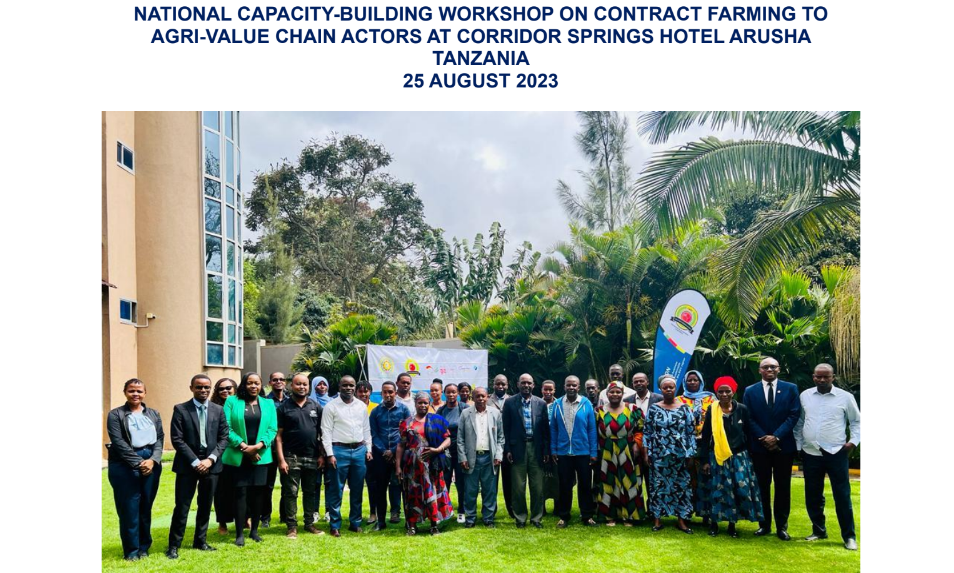
Capacity-Building Workshop On Contract Farming To Agro-Value Chain Actors

Capacity-Building Workshop On Contract Farming To Agro-Value Chain Actors
Enhancing Competitiveness of Agri-food Industry and Mitigating Impact on Food Security in the EAC Region
East Africa,
1.0 INTRODUCTION
The ongoing global challenges of COVID-19, Conflict, and Climate Change have created unprecedented hurdles for East African Community (EAC) economies and the growth of businesses in the region. Recognizing the urgency to fortify the Agri-food sector, the East African Business Council (EABC) joined forces with Sequa GmbH under the Business Scouts Fund. The collaborative initiative focuses on the “Enhancing Competitiveness of Agri-food Industry and Mitigating the Impact of Global Crises to Improve Food Security in the EAC Region.”
A significant stride in this effort was the Master Trainers Capacity-Building Workshop on “EAC Export Procedures and Contract Farming,” organized by EABC in Kampala, Uganda, on Monday, 24th July 2023. This event aimed to equip Agri-actors with the latest developments in Contract Farming within the Agri-value chain and EAC Export Procedures for Food Products, fostering improved technical and contractual capabilities.
2.0 OBJECTIVE OF NATIONAL CAPACITY-BUILDING WORKSHOP
Following the regional training, EABC, in collaboration with the Tanzania Horticultural Association (TAHA), conducted the National Capacity-Building Workshop on Contract Farming in Arusha, Tanzania, on 25th August 2023. The primary objective was to enhance the capacity and skills of Agri-actors in Contract Farming, specifically in Tanzania, aiming to elevate the competitiveness of the Agri-food industry and address the impact of global crises on regional food security.
The workshop sought to empower participants with negotiation skills for fair and mutually beneficial contracts, a profound understanding of their rights and responsibilities, and effective management of various aspects of contract farming, including quality control, pricing mechanisms, and dispute resolution.
3.0 PARTICIPANTS
The workshop brought together 35 stakeholders from the Agri-Value chains, District Authorities, and the media to deliberate on farming principles, processes, and best practices related to Contract Farming in the East African Region.
4.0 OPENING REMARKS
Mr. Frank Dafa, EABC Manager of Policy & Standards, emphasized the impact of global crises on food security, underlining the vulnerability of Africa as a net importer of agricultural products. He shared insights from the EABC-GIZ Business Scouts study, highlighting the potential for the EAC to produce essential commodities, such as wheat, edible oil, leguminous plants, root tubers, and fertilizer. Through the EABC-GIZ Sequa GmbH project, EABC aims to bolster skills and capacity in contract farming and EAC export procedures, fostering increased agricultural productivity, market access, and crisis mitigation.
Policy Analyst Mr. Jerry Moshi from TAHA urged Agri-actors to leverage the workshop to understand key challenges affecting their operations. He stressed the workshop’s goal to empower farmers, processors, and buyers with the knowledge and skills necessary for effective engagement in contract farming arrangements.
Mrs. Martha Ndelekwa, Chairperson of the Women Farmers’ Group in Ngulelo, Arusha, expressed enthusiasm, stating that the contract farming training would empower their group to negotiate fair and mutually beneficial contracts.
5.0 THE TRAINING SESSION
Contract farming, as discussed during the workshop, offers numerous benefits, including establishing agreements on value distribution, risk allocation, and decision rights. This practice can significantly reduce uncertainty for producers, providing guaranteed outlets and income certainty through pre-season pricing agreements. Successful contract farming can lead to higher and more stable incomes, contributing to poverty reduction.
However, risks exist, such as shifting farm production to cash crops, potentially impacting the production of basic food crops. To address these challenges, the workshop provided a platform for insightful discussions, leading to a set of recommendations to strengthen the contract farming ecosystem in the region.
6.0 RECOMMENDATIONS ON CONTRACT FARMING
The recommendations arising from the workshop include:
i. Addressing Asymmetric Bargaining Power: Encouraging the formation of farmer organizations and cooperatives to fortify collective bargaining power.
ii. Advocating for Transparent Contracts: Promoting the use of contracts that outline terms and conditions, ensuring an equitable distribution of risks and benefits.
iii. Mitigating Unfavorable Contract Terms: Facilitating training programs in legal and financial literacy for farmers to enhance their understanding of contract terms and negotiation skills.
iv. Encouraging Standard Contract Templates: Advocating for the adoption of standard contract templates that safeguard the interests of both contracting parties.
v. Addressing Price Volatility and Market Risks: Implementing price stabilisation mechanisms such as price floors or market-linked pricing to shield farmers from sudden price fluctuations.
vi. Enhancing Access to Credit and Inputs: Strengthening support from financial institutions by offering accessible and affordable credit options to contract farmers for the procurement of inputs and equipment.
vii. Streamlining Legal and Regulatory Frameworks: Urging the government to simplify legal and regulatory frameworks to reduce bureaucracy, fostering a conducive environment for contract farming.
viii. Ensuring Long-Term Viability: Encouraging farmers to diversify crops and explore various markets to reduce over-reliance on specific contracts or buyers.
ix. Supporting Value-Added Products: Providing support to farmers in developing value-added products and exploring alternative income streams for long-term sustainability.
The East African Business Council (EABC) and its partners remain committed to enhancing the resilience and competitiveness of the Agri-food industry in the East African Community. Through strategic initiatives and collaborative efforts, the aim is to build a robust and sustainable foundation that addresses current challenges and prepares Agri-actors for a resilient future.